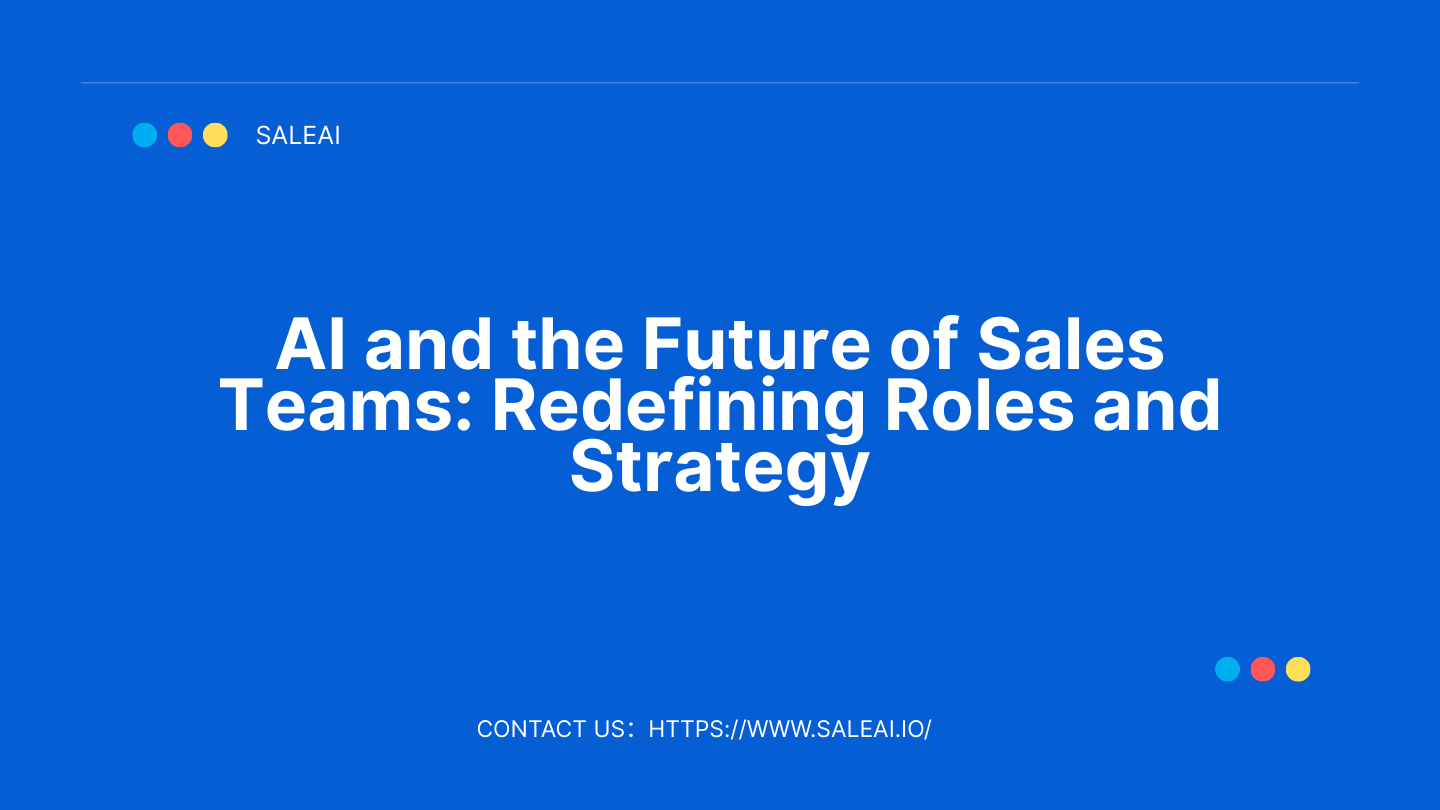Introduction
For decades, the structure of sales teams has remained largely unchanged. Lead generation, outreach, follow-ups, quoting, and reporting were handled manually by sales reps juggling multiple responsibilities. But in today’s digital-first, data-rich environment, this model is reaching its breaking point.
Research from Salesforce shows that sales reps now spend over 70% of their time on administrative tasks instead of selling. The result? Slower growth, higher burnout, and underutilized talent.
Artificial intelligence (AI) is rewriting this story. Platforms like SaleAI are shifting sales teams from task execution to strategic decision-making. The future of sales is not “AI replacing humans,” but AI redefining roles so humans can focus on what they do best: building relationships and driving strategy.
Why Traditional Sales Team Structures Are Breaking
The old sales model divides teams into hunters (lead generation), farmers (account managers), and closers. This division worked when manual processes dominated, but in the digital age, it exposes major inefficiencies:
-
Manual lead generation wastes hours on low-quality prospects.
-
Generic outreach reduces response rates.
-
Slow quoting kills momentum.
-
Reporting becomes fragmented and retrospective.
According to Forrester, companies with outdated sales processes lose up to 27% of revenue potential compared to digitally enabled competitors. The sales team of the future requires a new operating system—one built on AI.
How AI Reassigns Sales Roles
AI takes on the heavy lifting of repetitive, low-value tasks, freeing sales teams to focus on high-value work.
With SaleAI’s agents:
-
Lead Finder Agent sources verified prospects in minutes.
-
Email Writer Agent drafts tailored outreach messages automatically.
-
Quote Generator Agent produces polished, branded quotations instantly.
This shift means sales reps no longer need to spend days chasing down contact lists, drafting generic emails, or formatting quotes. Instead, AI becomes the execution engine, while humans step into the role of strategists, negotiators, and relationship-builders.
From Reps to Strategists: The New Sales Skillset
As AI takes over repetitive workflows, sales professionals must develop new skills:
-
Data interpretation – Knowing how to act on buyer signals and predictive insights.
-
Strategic planning – Designing account-based strategies and multichannel campaigns.
-
Relationship management – Focusing more time on trust-building conversations with buyers.
Tools like Company Insight Agent and Report Builder Agent empower salespeople with intelligence that guides these higher-level activities. Instead of guessing whether a lead is worth pursuing, they have the data to make informed decisions.
The Harvard Business Review emphasizes that tomorrow’s sales leaders will be “trusted advisors” rather than “transactional sellers.” AI enables this evolution by removing the grunt work.
The Rise of AI-Enabled Collaboration
AI doesn’t just change individual roles—it reshapes how teams collaborate.
With Outreach Planner Agent, entire sales teams can align around coordinated, multichannel outreach strategies. Instead of each rep improvising their own follow-up schedule, AI ensures consistency across the organization.
This creates new dynamics:
-
Marketing and sales align more tightly, using shared AI insights.
-
Managers gain real-time visibility into pipelines, enabling faster course corrections.
-
Teams collaborate on strategy rather than scrambling over execution details.
AI acts as the “glue” that connects individuals into a more cohesive, coordinated sales unit.
Case Example: A SaaS Firm Rebuilding Its Sales Org with AI
A mid-sized SaaS company struggled with inefficiencies in its sales team. Reps spent half their time sourcing leads and formatting quotes, leaving little room for strategic engagement with buyers.
By adopting SaleAI:
-
Lead Finder Agent automated prospecting.
-
Email Writer Agent created personalized cold emails and follow-ups.
-
Quote Generator Agent handled all proposals.
-
Outreach Planner Agent aligned outreach strategies across the team.
-
Company Insight Agent gave real-time buyer intelligence.
-
Report Builder Agent provided managers with clear performance insights.
The impact:
-
Sales team size was reduced by 20%, but output increased by 40%.
-
Reps spent more time in client meetings and negotiations.
-
Managers restructured compensation around strategic contributions, not just activity volume.
The firm redefined its sales organization as lean, strategic, and AI-augmented.
Strategic Implications for Business Leaders
For executives, AI’s impact on sales teams is not just operational—it’s strategic. Leaders must ask:
-
What tasks should be automated vs. human-led?
-
How will sales roles evolve over the next 3–5 years?
-
What new skillsets should we develop in our teams?
McKinsey predicts that by 2030, nearly one-third of all sales activities will be automated, but human roles in negotiation and relationship-building will grow in importance. The businesses that win will be those that integrate AI into sales structures early, redefining roles before competitors do.
Conclusion: Redefining Sales in the Age of AI
The sales team of the future is not bigger—it’s smarter. AI takes over the tasks that bog down productivity, while humans rise into roles that require judgment, creativity, and empathy.
With SaleAI, businesses can:
-
Automate repetitive tasks with Lead Finder Agent, Email Writer Agent, and Quote Generator Agent.
-
Empower strategists with insights from Company Insight Agent and Report Builder Agent.
-
Align teams with Outreach Planner Agent.
AI is not here to replace sales teams—it’s here to elevate them into the next era of strategy, collaboration, and growth.
Ready to reimagine your sales team for the AI era?
👉 Start your free trial with SaleAI and see how AI can transform your sales structure and strategy.



